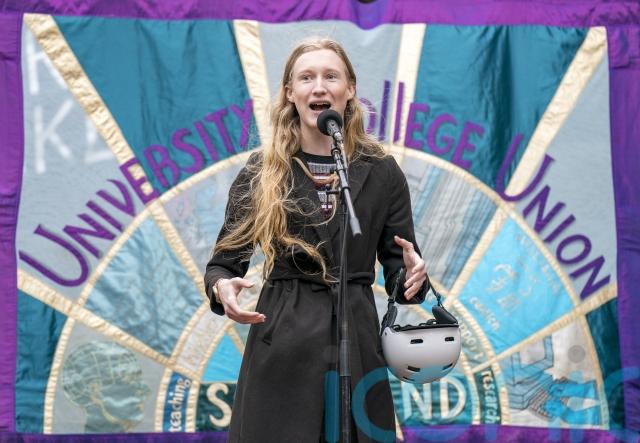
There is a “very significant risk” a university in Scotland could have to close, MSPs have been told – with an expert suggesting introducing tuition fees could be one way to ensure institutions are better funded.
Dr Gavan Conlon, a partner with economics consultancy London Economics, argued “introducing fees in some way, shape or form, or a graduate endowment” could be one way of ensuring Scotland’s universities can “punch their weight” when compared to their counterparts in England.
His comments came as he told MSPs on Holyrood’s Education Committee that, as it stands, the SNP ministers’ flagship policy of providing free university tuition for Scottish students attending university north of the border meant students are “actually paid to go to university”.
He spoke about the financial pressures facing the university sector in Scotland – saying more than half of institutions are in deficit and are “running seriously on their overdraft”.
Dr Conlon said: “Probably about half of those institutions don’t have any sort of reserves whatsoever to cover what is essentially their overdraft.”
Scottish ministers need to give “very serious concern and attention” to what could happen if a university shuts, he insisted, with the expert stating: “I think there is a very, very significant risk of that.”
He went on to tell MSPs: “Honestly, if you want to fund institutions better, so they can punch their weight, and they already punch their weight, but if you want to have them comparable to England, essentially, there has to be some form of additional cost passed on to graduates, they don’t pay enough compared to elsewhere in the UK.
“So, that might be the introduction of real interest rates, that might be reducing repayment thresholds, that might be introducing fees in some way, shape or form, or a graduate endowment, whatever you want to call it.
“But that would certainly save a huge amount of resource compared to the current state of play.
“By introducing the English system in Scotland that would save Scottish Government 40% of its total cost of higher education overnight.”
Very pleased to be presenting evidence on HE Fees and Funding to the Scottish Parliament Education, Children and Young People Committee this week in Edinburgh. Some of the @NuffieldFound funded reports belowhttps://t.co/sB7oDayA8z
— LE Education (@LE_Education) June 3, 2024
Public investment in higher education in Scotland is currently some five times higher than the amount per capita that is spent in England, Dr Conlon said, telling the committee much of that cash goes on tuition fee support.
Despite this, he said: “Universities are relatively underfunded in Scotland compared to England and Wales and Northern Ireland, they’re the least well-funded.
“At the moment, despite the Scottish Government putting in five times the amount per capita, universities are the least well-funded.
“In England – I’m not saying this is the correct approach – in England an English-domiciled student contributes about 16% of the cost of higher education and the exchequer contributes 84%.
“In Scotland, essentially, students are actually paid to go to university. The level of contribution by the Scottish Government is more than 100% because there are free fees and there is maintenance, and there is loan write-offs.
“So, the balance of contributions is wrong, because the benefits of higher education are accrued more widely, they are accrued by the individual and by the public purse, so there should be a balanced contribution.”

However, those representing both academics and students backed the continuation of free university education, which has been in place since 2008 when the SNP government at Holyrood scrapped the graduate endowment fee which was charged to students on graduation.
NUS Scotland president Ellie Gomersall said: “Unsurprisingly, NUS is very strongly opposed to any form of tuition fee, no matter what you call it.”
She cited research from 2020 which she told MSPs had found that two-thirds of people could potentially be put off going to university if fees were introduced.
Mary Senior, of the University and College Union, said “higher education should be free to those that are able to participate in it”.
Ms Senior told the committee: “My understanding is all political parties believe that.
“We believe that commitment that you have all made, that political choice, needs to be properly funded through the public purse.”
A Scottish Government spokesperson said: “The Scottish Government is resolute in its commitment to free tuition.
“The latest data shows since this policy was put in place, the number of Scottish students entering full-time first degree courses at university has increased by 31%, with record numbers of students from our poorest communities as a result of the Scottish Government’s commitment to widening access to university.
“Ucas data also highlights record numbers of young people aged 19 and under securing a university place in Scotland in the most recent cycle. Scotland’s student debt levels are also the lowest in the UK, almost three times lower than in England.
“Our universities play a pivotal role in Scotland’s economy and society – and despite facing the most challenging budget since devolution, the Scottish Government will invest over £1 billion on teaching and research, including an increase in funding for research and innovation. This will ensure our universities continue to play a pivotal role in Scotland’s economic growth.”
Subscribe or register today to discover more from DonegalLive.ie
Buy the e-paper of the Donegal Democrat, Donegal People's Press, Donegal Post and Inish Times here for instant access to Donegal's premier news titles.
Keep up with the latest news from Donegal with our daily newsletter featuring the most important stories of the day delivered to your inbox every evening at 5pm.